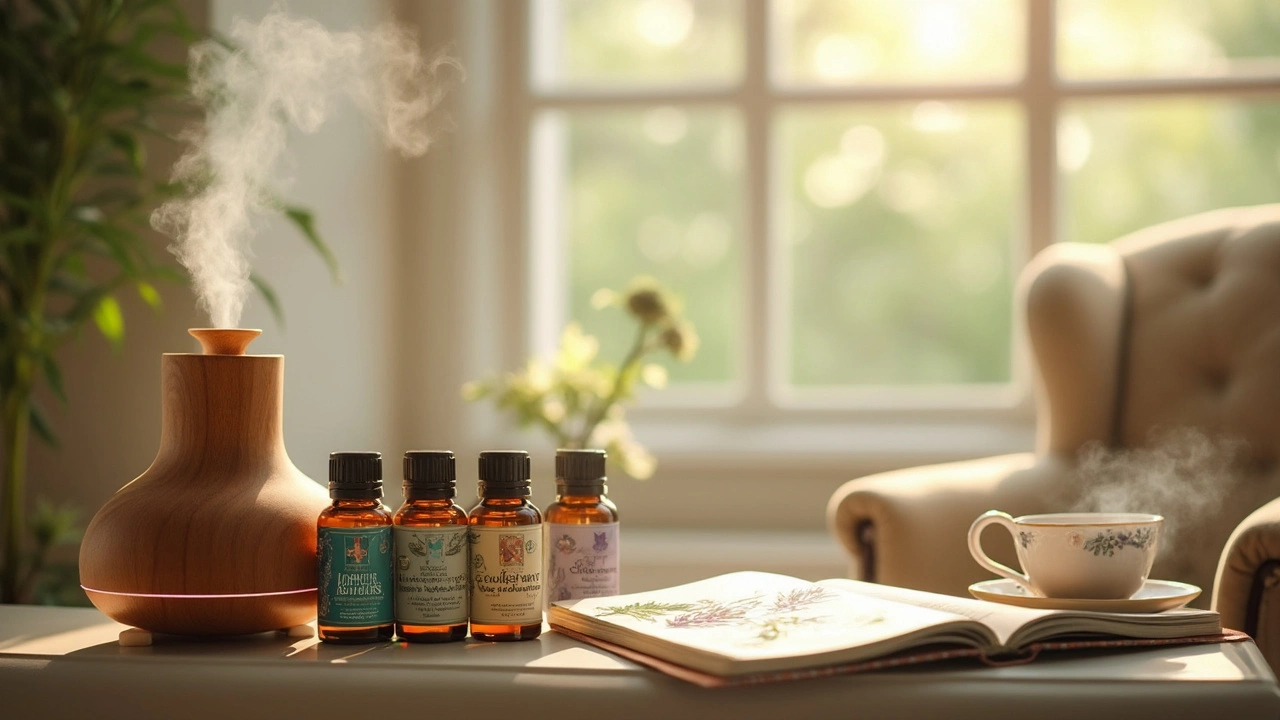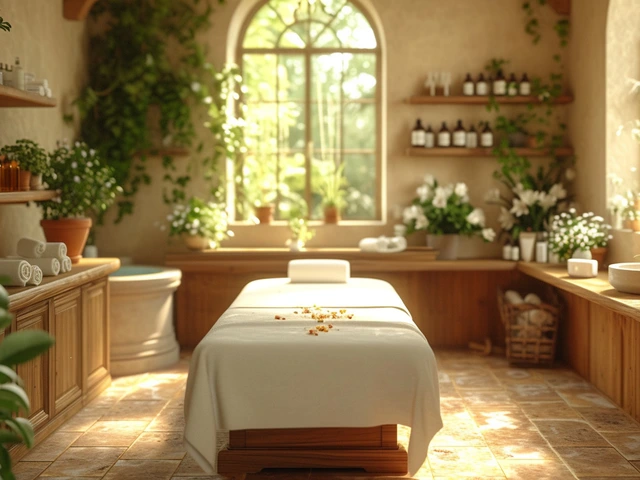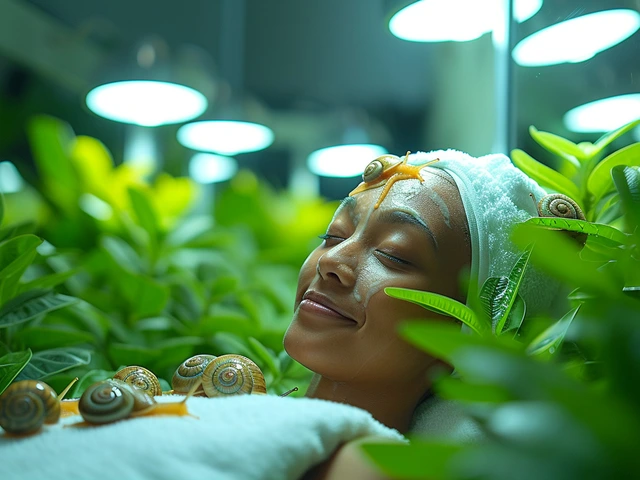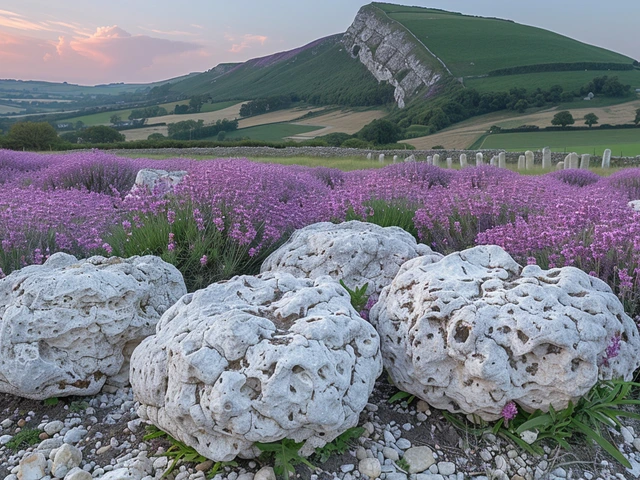Aromatherapy sounds fancy, but it’s basically a way to use plant oils to boost your well-being. Imagine walking into a room and instantly feeling calmer because of the scent in the air—there’s some science behind that. Essential oils, like lavender, peppermint, or eucalyptus, are at the heart of it all. They come straight from plants and pack a punch when it comes to scent and, surprisingly, mental and physical effects.
If you’ve ever sniffed peppermint oil to wake yourself up, or leaned into lavender before bed, you’ve already dabbled in aromatherapy. The cool part? There’s more to it than just smelling good. Certain oils can help you sleep, others help you focus, and some even soothe headaches. Blending these oils into your daily routine is simpler than you think—no need for an expensive diffuser or a cabinet full of mysterious vials. You just need a few basic oils and some know-how, which we’ll get into. Ready to see just how powerful a few drops can be?
- What Is Aromatherapy?
- How Do Essential Oils Work?
- Proven Benefits and the Science
- Popular Essential Oils and Their Uses
- Tips to Use Aromatherapy at Home
- Staying Safe: What You Need to Know
What Is Aromatherapy?
Aromatherapy is all about using the scents from natural plant extracts—also called essential oils—to support your health and mood. It’s not new or trendy; people have been doing this for thousands of years, with roots going back to ancient Egypt, India, and China. They used oils for everything from religious rituals to medicine and even beauty routines. Fast forward to today, and the core idea is still the same: tap into these plant oils to make life a little better.
Here’s how it works: when you breathe in these concentrated plant scents, special sensors in your nose send signals straight to the part of your brain that handles emotions, stress, and memories. That’s why one whiff of chamomile can mellow you out, or peppermint can make you feel alert.
The big players in aromatherapy are essential oils. They’re called “essential” because they capture the plant’s pure scent and helpful properties. Common ones include lavender, tea tree, and eucalyptus. These oils are super versatile—you can add them to a diffuser, mix with lotion, or even use a drop on a tissue. No magic required, just science and a bit of know-how.
Here’s a quick snapshot of how folks typically use aromatherapy:
- Inhaling oils by using a diffuser, personal inhaler, or sniffing them straight from the bottle
- Adding a few drops to baths or showers
- Blending with carrier oils (like coconut or jojoba oil) for massage
- Mixing into lotions or skin care for targeted benefits
| Global Aromatherapy Market (2024) | Top Essential Oils Used |
|---|---|
| $2.6 billion (USD) | Lavender, Peppermint, Tea Tree, Eucalyptus |
People turn to aromatherapy for stress relief, better sleep, energy boosts, or just a lift in mood. And while it won’t fix everything, it’s a simple tool you can use at home or on the go. The bottom line? Aromatherapy is your shortcut to using plants for real-life benefits, one sniff at a time.
How Do Essential Oils Work?
Essential oils do their thing mainly through your sense of smell and straight-up skin contact. When you sniff an oil, the scent molecules shoot straight to a part of your brain called the limbic system. This area handles emotions, stress, and even memory—so, yeah, certain scents really can help you chill out, perk up, or remember that cozy holiday at grandma’s.
When you put oils on your skin—diluted with a carrier oil like coconut or almond—they can pass through the outer layers and get into your bloodstream in a small amount. This is why rubbing peppermint oil on your temples might actually make your headache feel better (there are studies showing this works for some folks). But you never want to use them pure on your skin—they’re super concentrated and could cause a rash or irritation.
Here’s a quick list of the main ways people use essential oils today:
- Aromatherapy diffusers: These little gadgets break oils into tiny droplets you breathe in. Super popular for setting a mood at home or at work.
- Topical use: This means rubbing diluted essential oils on your skin, usually for things like muscle soreness, tension, or skincare.
- Inhalation: Sometimes, just sniffing from the bottle, or putting a drop on a tissue, does the trick for instant focus or relief.
Some numbers: A review from the International Journal of Neuroscience in 2022 found that almost 65% of people using essential oils did so for stress or mood management, while about 23% used them to help with sleep. So you’re not alone if you’re hoping to take the edge off after a long workday!
Not all oils do the same thing. For example, lavender tends to relax, while citrus oils like orange or lemon can give you a burst of energy. So choosing the right one for the right moment is key for the best results—and always make sure you’re sniffing or applying oils sourced from trusted brands to make sure you’re getting the real deal.
Proven Benefits and the Science
You might be wondering—does aromatherapy actually work, or is it just hype? Turns out, there’s real science here. When you breathe in essential oils, your nose sends signals to the brain’s limbic system, which controls mood, memory, and emotions. That’s why certain scents hit you right in the feels, whether it’s helping you chill out or perk up.
Let’s look at what researchers say. Lavender oil has been tested for its ability to lower anxiety. In a 2012 clinical trial, people who inhaled lavender essential oil before surgery reported noticeably less stress than those who didn’t. Then there’s peppermint oil. A lot of folks use it for headaches, and small studies suggest it can ease tension headaches when rubbed on the temples. Rosemary oil gets credit for boosting alertness—college students in a 2017 study scored better on memory tests after breathing it in while studying.
- Aromatherapy isn’t a magic fix, but it can be a helpful tool for managing mood and stress when used alongside other healthy habits.
- Some hospitals now offer essential oil diffusers in labor wards or cancer centers to help patients manage pain and nerves.
- If you struggle to sleep, there’s actual science showing that diffusing a little lavender oil in your bedroom can lead to deeper, more restful sleep.
The research isn’t perfect—scientists want more big studies before calling it a cure for anything. However, the overall vibe is pretty positive, especially for stress, light pain, and trouble falling asleep. The bonus: it’s low risk if you use oils correctly, so a little experimenting at home is easy and safe for most adults.
| Essential Oil | Main Benefit |
|---|---|
| Lavender | Reduces anxiety, helps with sleep |
| Peppermint | Eases headaches, boosts focus |
| Rosemary | Improves memory |
| Eucalyptus | Clears sinuses, refreshes the mind |
If you want to get results, stick to high-quality oils and follow basic safety tips. The research keeps growing, but even right now, there’s enough proof to say aromatherapy isn’t just a trend—it’s got real benefits you can feel.
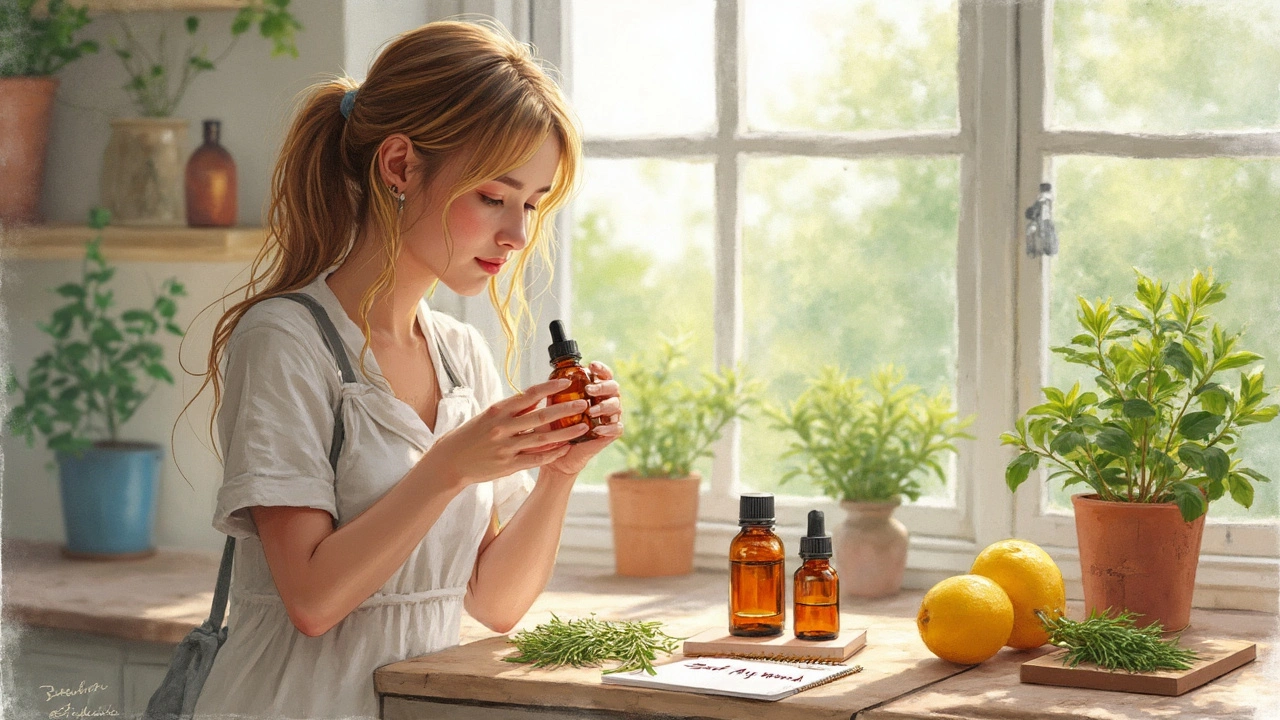
Popular Essential Oils and Their Uses
If you’re new to the world of essential oils, it can be overwhelming to know where to even start. You don’t need to collect dozens—a few go a long way. Here are some of the most well-used oils in aromatherapy and why people keep them close by:
- Lavender Oil: Known as the “chill out” oil. If you have trouble winding down at night, a drop on your pillow might help you sleep. Lavender is super popular for relaxation, easing anxiety, and even soothing minor skin irritations.
- Peppermint Oil: This one’s a go-to for focus and headaches. A little sniff can perk up your senses if you feel foggy. Some folks rub it (diluted) on their temples for tension headaches or muscle soreness.
- Eucalyptus Oil: Breathing feeling a bit blocked? Eucalyptus is famous for clearing stuffy noses and giving your sinuses a break. Just don’t put it straight on your skin without mixing it with a carrier oil.
- Tea Tree Oil: Got a breakout or minor cut? Tea tree is a staple for its fresh smell and antibacterial punch. It’s added to a lot of acne products for a reason, but it’s strong—always dilute it first.
- Lemon Oil: Starting to slump by mid-afternoon? Lemon oil’s zesty scent is super uplifting and can help zap away grogginess. It also gets used a lot in cleaning mixes because of its antibacterial and refreshing qualities.
To show how these oils fit into daily life, check out this quick reference:
| Essential Oil | Main Benefit | Typical Way to Use |
|---|---|---|
| Lavender | Relaxation, better sleep | Diffuse, bath, pillow |
| Peppermint | Boost focus, ease headaches | Inhale, massage with carrier oil |
| Eucalyptus | Clear sinuses | Steam, room diffuser |
| Tea Tree | Purify, fight blemishes | Diluted on skin |
| Lemon | Lift mood, freshen air | Diffuse, add to cleaners |
These oils are everywhere because they work for so many people in simple, practical ways. The key to getting the most out of them is knowing how to use them safely—never put undiluted oils on your skin, and don’t eat them. Start small and see what makes a difference for you.
Tips to Use Aromatherapy at Home
Getting started with aromatherapy at home doesn’t have to be complicated or pricey. You just need a few basic oils, a way to use them safely, and a bit of know-how. Here’s how you can actually make it work in your daily routine:
- Pick the right oils for your needs.
Lavender is great for sleep, peppermint can wake you up, eucalyptus helps clear sinuses, and tea tree is good for minor skin irritations. - Use a diffuser. Electric diffusers are easiest and safest. Just follow the instructions and use the right amount of oil (usually 3–6 drops). No diffuser? Add a few drops to a bowl of hot water or even a damp washcloth—just don’t put oils directly on skin unless diluted.
- Steam inhalation can help with colds. Put a few drops of eucalyptus oil into steaming water, lean over the bowl, and breathe in the vapor (cover your head with a towel). Instant relief for clogged noses, but keep your eyes closed to avoid irritation.
- Make your own room sprays. Fill a spray bottle with water and a few drops of oil. Shake and spritz around your home—perfect for freshening up bedding or bathrooms.
- Try roll-ons for stress or headaches. Mix a few drops of essential oil with a carrier oil (like coconut or almond). Roll onto your wrists, temples, or behind the neck for quick relief on the go.
If you want to maximize results, pair scents with times of day. Citrus oils can boost your mood in the morning, lavender at night helps you wind down. Just never use essential oils directly on pets, as some can be harmful—even diffused oils should be used in a well-ventilated area.
| Oil | Common Use | Extra Tip |
|---|---|---|
| Lavender | Better sleep | Add a few drops to your pillow |
| Peppermint | Focus, headaches | Inhale before tough tasks |
| Eucalyptus | Congestion | Try in the shower |
| Tea Tree | Skin issues | Dilute before applying |
Stick to quality oils from trusted brands. Cheaper oils can have weird additives or not be pure at all. Take your time to experiment—finding your favorite blend is half the fun!
Staying Safe: What You Need to Know
Aromatherapy sounds pretty chill, but there’s real stuff you need to watch out for, especially when dealing with concentrated plant oils. These tiny bottles aren’t just about nice smells—using them wrong can burn your skin or even mess with your health. That’s why it pays to learn the basics.
First off, most essential oils shouldn’t go right on your skin. Always mix them with something else—like coconut or sweet almond oil—before using them. This is called “dilution,” and it helps prevent rashes, burns, or allergic reactions. Here’s a quick look at safe dilution amounts:
| Who’s Using | Essential Oil Amount | Carrier Oil Amount |
|---|---|---|
| Adults | 3-6 drops | 1 tablespoon |
| Kids & Elderly | 1-2 drops | 1 tablespoon |
Never swallow essential oils. Even though they come from plants, a tiny amount by mouth can lead to serious problems, like tummy troubles or even poisoning. If you’re pregnant, nursing, have epilepsy, asthma, or other health conditions, it’s smart to check with your doctor before jumping in.
Some oils aren’t safe for everyone. For example, eucalyptus and peppermint aren’t recommended for young kids. Citrus oils (like lemon or orange) can also make your skin extra sensitive to the sun—so if you use them on your skin, don’t go sunbathing right after.
Storing oils right matters too. Keep them in cool, dark places and close the lids tightly. A bottle left in the sun or heat can lose its kick or even turn bad.
Quick safety tips for using essential oils at home:
- Always dilute before applying to skin.
- Test on a small patch first to check for reactions.
- Keep oils away from eyes, nose, and open wounds.
- Store away from kids and pets.
- Don’t mix oils unless you know how they interact.
Staying smart with aromatherapy means you get all the good stuff and skip the trouble. If you ever have a reaction—like a rash, trouble breathing, or burning—stop right away and get medical help if it doesn’t clear up quickly. Keeping safety in mind lets you enjoy all the perks without the stress.
